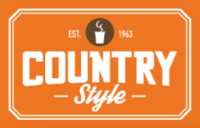Country Style
 Country Style Food Services Inc.
Country Style Food Services Inc.Country Style Food Services, Inc., formerly Country Style Donuts, is a fast/casual chain of coffee shops operating primarily in the Canadian province of Ontario (where it ranks second among coffee chains), which serves oatmeal, soup, sandwiches, salads, and coffee. The chain is based in Richmond Hill, Ontario.
In January 2006, there were 120 "traditional" locations in Ontario. There are over 420 "non-traditional" locations embedded in other stores such as gas stations, convenience stores, arenas and movie theatres. Over 70% of customer purchases in 2001 were coffee. In total, Country Style has over 1000 locations in Ontario, Nova Scotia, Prince Edward Island and New Brunswick under the Country Style/Bistro name.
Country Style has been in business since 1963 when it opened its first location in Toronto. Donut stores only accounted for about 17% of donut sales in Canada at that time so there was still a lot of room for growth (most were sold at supermarkets in bulk). Country Style experienced a lot of growth early on, opening 100 stores in the first 15–20 years of existence. It had 50 outlets in 1974 when it was the leading coffee and donut establishment in Canada above Tim Hortons (which passed it two years later). It began to expand into Western Canada in the 1970s (including Vancouver and Calgary) and the East in the early 1980s. Poor results caused the franchise to withdraw from these regions: locations in Alberta were the only ones to survive into the 1990s, while in the East, it was ones in Nova Scotia and PEI.
By 2001, Country Style had been forced to close a quarter of its stores due to decreasing market share in an increasingly competitive Canadian market. Since then, it has opened many new stores and now ranks third behind Tim Hortons and Starbucks in the Canadian coffee market. On November 1, 2011, its parent company, MTY Food Group, bought Mr. Sub for $23 million merging it with Country style to become Country Style Food Services Holdings Inc.
In the mid-1990s the Country Style logo was changed to use a font similar to Palatino instead of its former handwriting font.
In 2006, Country Style changed its image to a more upscale style: "Country Style Bistro Deli". The new image includes a new logo, a new website, and an enhanced branded deli menu that will be phased into all stores. The logo still uses the Palatino style font and will also be phased into all stores. New stores will feature more modern design features, somewhat similar to Starbucks, and provides wide range of wraps, smoothies, breakfast, salads and sweets. In 2009, the brand rights to Country Style, used at 900 locations, were purchased by MTY Food Group of Montreal for $14.6 million in cash and debt.
...
Wikipedia